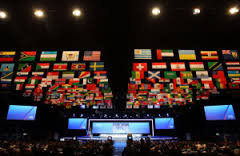By Andrew Warshaw, chief correspondent, in Mauritius
May 27 – It’s not every day that Mauritius, renowned as one of the world’s most exclusive tourist destinations, becomes the centre of attention for footballing reasons.
But over the next 48 hours, the great and the good of world football will start converging on this Indian Ocean island, with its idyllic climate and blissful beaches, for one of the most eagerly awaited FIFA Congresses of recent years.
In fact a few have already arrived. CONCACAF President Jeffrey Webb and FIFA’s top medical man, Belgium’s Michel d’Hooghe, flew in from London via Dubai today and will be followed by scores of other powerbrokers for two days of confederation meetings followed by the Congress itself on Thursday and Friday.
The average fan, not surprisingly, must wonder why on earth such a remote dot on the landscape – Mauritius’ tiny International airport has only two conveyor belts – was selected for FIFA’s 209 member nations to do their business.
Cynics might argue that in their spare time, the delegates and their wives will have plenty to enjoy in terms of the local culture and cuisine. But putting such cynicism aside, the summit promises to be highly significant, coming as it does at the conclusion of FIFA’s much-trumpeted two-year road map to reform following a string of corruption cases.
No-one knows exactly which measures will end up being approved and which will be ditched. Age limits? Term limits? Integrity checks? For the moment at least, all are up for discussion but Tuesday’s FIFA executive committee meeting is expected to be pivotal in terms of deciding precisely what to recommend to Congress, and what not to, though there is bound to be considerable hard bargaining and compromise between now and Friday when the reform package – so important to the credibility not only of FIFA but also its president, Sepp Blatter – is finally put to the vote. Interestingly no media press conference has been scheduled for after the exco, an indication perhaps of the sensitivity of the debate.
Critics of the way the process has been handled – not least the advisory Transparency International group and the FIFA-appointed Independent Governance Committee that came up with the original corruption-curbing proposals – have consistently claimed that many of the statute-changing measures have been watered down and that Congress will end up voting on nothing more than cosmetic tinkering.
But in an interview with his organisation’s own website, Blatter insisted that FIFA had followed “the majority” of the 10-point plan recommended by the IGC and its Swiss law professor Mark Pieth. “There has been an extensive consultation process observed in order to receive input from the member associations, who ultimately are the ones voting,” said Blatter. “We have a democratic process in place, we follow it. Between 2011 and 2013, I made a lot of effort to take this reform process as far as I could, but it is now up to the FIFA Congress to decide on these measures.”
“I understand Transparency International pushes for more. They have their own idea on how the reform process could have been done, I acknowledge that. However, I believe in our process, we achieved a lot already and the system in place works well. I think it’d be unfair to say we are not doing well.”
Blatter has still not decided definitively whether to stand for an unprecedented fifth term of office despite previously asserting that he would step down in 2015. No surprise, then, that he appears uncomfortable with age and term limits.
“Well, it’s not up to me, as I said we are in a democratic process with the Member Associations voting,” Blatter told Fifa.com. “However, personally, I’ve already said I was against the age limit as I believe it is not a relevant criteria, not everyone is the same at 60, 70, 80, etc. It could even be seen as discriminatory. Passion makes the difference. However I am not against a limitation of a number of mandates, this rule applies in many democracies in fact. But then it should apply to everybody.”
It is no coincidence that in the buildup to Congress, most of the six confederations are planning strategy meetings, with two of them – CONMEBOL and the OFC – using Mauritius to hold their own individual congresses.
As for UEFA, which looks increasingly as if it will play the role of kingmaker or deal-breaker, Michel Platini has already hinted strongly that his 53 members might block the reform process unless key alterations are made. European nations have not taken kindly to Blatter’s suggestion that they hand over some of their World Cup places to developing continents like Asia and Africa in the future.
Might they get their own back this week? Platini, at last week’s UEFA Congress, didn’t say that in so many words. But he did make the point that gaining the required three-quarters majority to change any of FIFA’s statutes would be “very difficult” -hardly a unconditional statement of support.
Contact the writer of this story at moc.l1743723947labto1743723947ofdlr1743723947owedi1743723947sni@w1743723947ahsra1743723947w.wer1743723947dna1743723947
